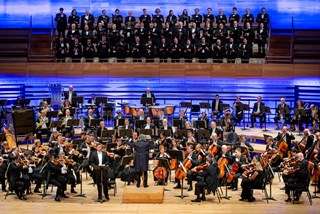|
Back
Montrealers Treated to Shostakovich’s Babi Yar Montreal
Maison symphonique de Montréal, Place des Arts
09/17/2019 - & September 18, 2019
Arnold Schoenberg: Six Pieces for Male Chorus, Op. 35 *
Sergei Rachmaninoff: Rhapsody on a Theme of Paganini, Op. 43
Dimitri Shostakovich: Symphony No. 13 in B-flat minor, “Babi Yar”, Op. 113
Denis Matsuev (Piano), Alexander Vinogradov (Bass)
Orchestre symphonique de Montréal Chorus, Andrew Megill (Chorus Master), Orchestre symphonique de Montréal, Kent Nagano (Conductor)
* September 18 only

(© Antoine Saito)
The Orchestre symphonique de Montréal (OSM) opened its 2019-20 season with a powerful and polished performance of Dimitri Shostakovich’s Symphony No. 13, Babi Yar. The composer created this monumental work in 1962 to honour the more than 34,000 Jews extinguished by the Nazis in a ditch near Kiev on September 29-30, 1941—the largest shooting massacre of the Holocaust up to that date. Over the next two years between 100,000 and 150,000 Jews, Soviet prisoners and others would be annihilated there. Based on poems by Yevgeny Yevtushenko, it consists of five movements (“Babi Yar”, “Humour”, “In the Store”, “Fears” and “Career”). It lasts over an hour and features a solo bass and male chorus.
The orchestra and chorus sounded well-rehearsed. They evoked the moods of each movement, from pathos, to humour, to fear and finally to hope, with a felicitous back and forth balance between the singers and the orchestra. Alexander Vinogradov’s rich, well-modulated bass, with just a hint of vibrato was perfect. It showed no strain or fatigue and was a joy to experience. The 45-member male chorus, prepared by Andrew Megill, delivered its lines with perfect intonation, articulation and an impressive mastery of Russian—a veritable Rolls Royce of vocal ensembles. The OSM has rarely sounded better—polished brass, shimmering strings, smooth woodwinds, supportive percussion and splendid solos from concertmaster Andrew Wan, trumpeter Paul Merkelo and tuba player Austin Howle. Kent Nagano maintained judicious control over the musicians. From delicate pianissimos to thunderous climaxes he paid careful attention to dynamics, phrasing and rhythm. Despite all the foregoing, however, the performance still lacked the most critical ingredient—the underlying momentum that sweeps both orchestra and audience towards the conclusion. This may be the reason that members of the audience near me (even critics!) were often flipping through their programs during the performance. One has to wonder if the holocaust survivors in the audience were moved to tears.
Technical proficiency wasn’t enough for Rachmaninoff’s Variations on a Theme of Paganini. Denis Matsuev, Artist-in-Residence of the OSM, may be a technical wizard but it was a shame to hear him pound his way through the concerto as if he were flogging a dead horse. The orchestra sounded ragged and distant from the pianist. Where was the style, the heart of the work? Even the well-known eighteenth variation lacked lyricism and taste.
In his opening remarks, Lucien Bouchard, the OSM’s President of the Administrative Council and a former premier of Quebec, thanked the outgoing conductor (this is Nagano’s last season) and the orchestra for their contribution to Montreal’s culture scene over the years. He also thanked the audience and sponsors for their continuing support and dedication.
Orchestre symphonique de Montréal’s Website
Earl Arthur Love
|